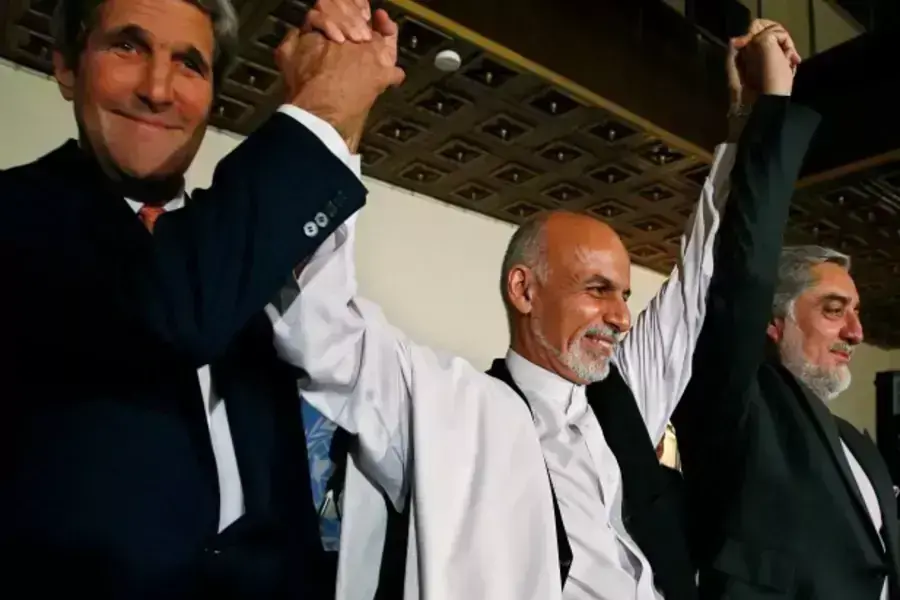How Kerry’s Election Deal Can Help Afghan Women

More on:
The deal that Secretary of State John Kerry recently brokered to recount votes in Afghanistan’s disputed presidential election demonstrates the United States still has a stake in the future of the war-torn country. The Kerry deal has helped ease the political crisis in Afghanistan by persuading the two rival presidential candidates, Ashraf Ghani and Abdullah Abdullah, to agree to a full recount of votes cast in the June 2014 runoff election, which was marred by allegations of widespread fraud. UN and international observers, along with observers from each campaign, will preside over the recount. The winner will then form a national consensus government, with the loser taking a position similar to chief executive and ultimately becoming prime minister if the relevant constitutional change is adopted. Incumbent President Hamid Karzai has agreed to retain his position until the new government is formed.
Just as Kerry has helped Afghanistan move beyond its electoral impasse, he should also ensure that the new government supports Afghan women and girls as well. Women are an emerging force in Afghanistan, with female turnout in the presidential runoff estimated at 37.6 percent. As discussed in my recent report, improving the status of women and girls is important for Afghanistan’s security, stability, and development. Investing in girls’ education and women’s economic opportunities enhances development outcomes for women, families, and communities, and correlates with reduced rates of conflict and violence.
Afghans themselves overwhelmingly support greater educational opportunities for women and girls. Even as Washington reduces its direct role and adjusts its leverage in the country, it should still establish policies that cement and extend the fragile gains Afghan women and girls have made since 2001. As Kerry has said, “investing in Afghan women is the surest way to guarantee that Afghanistan will sustain the gains of the last decade and never again become a safe haven for international terrorists.” Here are five steps Kerry should take to realize this goal:
1) Designate the special representative for Afghanistan and Pakistan as a co-chair for the State Department-led Afghan Gender Task Force in order to strength and coordinate Washington’s commitment to Afghan women and girls.2) Finalize and implement the Bilateral Security Agreement, which would allow U.S. forces to remain in Afghanistan past 2014 and is a key component to ensuring security for women and girls.
3) Bolster the integration of women into peace and security efforts by: doubling National Defense Authorization Act funding in 2015 to support the integration of women into the Afghan National Security Forces; support greater participation of women in any peace efforts; coordinate international donors to support Afghanistan’s implementation of a National Action Plan (NAP) on Women, Peace, and Security; and develop a bilateral NAP with Afghanistan.
4) Reverse the downward trend in USAID funding for girls’ education, as education in Afghanistan’s best economic development policy.
5) Support development strategies that enhance women’s leadership, not only through USAID’s Promote program aimed at urban women, but also by extending and funding programs the World Bank’s National Solidarity Program (NSP), which reaches rural women and requires that they be permitted to participate in decision-making for NSP community development council block grants. This has allowed women to develop and manage their own programs, challenging misconceptions about women’s capacity to lead. However, the NSP is set to end in September 2015 and facing a financing gap.
Both presidential candidates in Afghanistan have expressed support of women’s rights. Abdullah has argued that women should be integrated into the police force and that “no country can achieve security, peace and advance without ensuring the rights of the half of the society.” Ghani has also called upon women to actively participate in both the economy and politics, “from the villages up to the presidential palace.” Ghani supports steps to combat gender discrimination; increase the number of women in the judiciary; boost girls’ enrollment in higher education; and include women’s perspectives in peace talks with the Taliban. Moreover, while working at the World Bank, Ghani was one of the visionaries behind the NSP. Regardless of which candidate wins the recount, the United States should strongly support their efforts to advance the rights, opportunities, and security of Afghanistan’s women and girls.
More on:
 Online Store
Online Store
